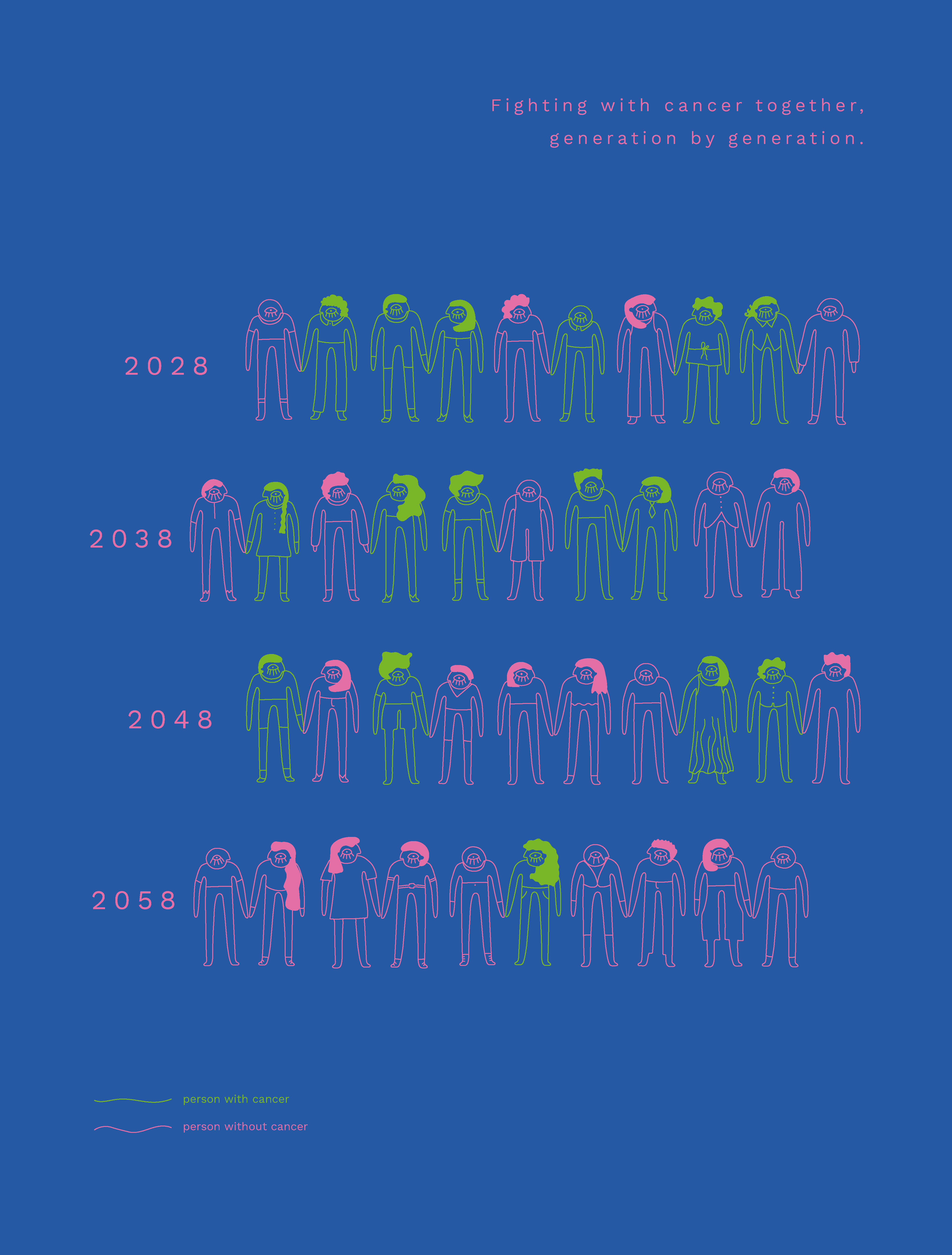Perfect Us
OBJECTIVE
This project is designed to provoke, unsettle, and spark dialogue. By blending speculative and critical design, it imagines alternative futures while exposing and questioning the assumptions that shape our present. The goal is not comfort but productive discomfort — to push people to think, debate, and reimagine what is possible.
APPROACH
At its core lies a critical examination of the future of precision medicine and its intersection with cancer care. The work confronts society’s obsession with technological perfection and the hidden greed that can drive medical innovation. Through carefully crafted design interventions, it challenges the status quo and compels audiences to grapple with the ethical and emotional consequences of medical progress.
︎︎︎ This project was made possible with the invaluable insights and collaboration of the Institute of Cancer Sciences Scotland and its specialists.
What is precision medicine?
Precision medicine is a personalized healthcare approach that considers an individual's genetic makeup, environment, and lifestyle. It uses this information to tailor medical treatments and interventions to the specific needs of each person. This approach aims to enhance treatment effectiveness and minimize potential side effects. The Future Experience project explores how advances in Precision Medicine affect the landscape of cancer care in 2028.
FIGHTING CANCER GENERATION BY GENERATION
In this future scenario, genetic knowledge is as everyday as checking the weather, and precision medicine has advanced to the point where cancer can be systematically prevented. Rather than creating a new obsession, society simply deepens its existing fixation on perfect lives, flawless relationships, and designer children.
At the heart of this vision stands Perfect Us — the leading force in the mission to eliminate cancer across generations. More than an app, it is a social infrastructure: a matching system that pairs people according to genetic compatibility. The higher the genetic score, the stronger and longer-lasting the relationship is predicted to be. Couples can even select an ideal genetic match for reproduction, ensuring healthy, cancer-free, and precisely designed offspring.
In this paradigm, love becomes a collective responsibility. Relationships are no longer private choices but strategic alliances in humanity’s campaign to cancel cancer. Choosing a partner is framed as a medical duty as much as a romantic decision.
Perfect Us acts as an algorithmic advisor, sparing individuals the “wrong” relationships and the wasted years of imperfect love, while steering them toward scientifically harmonious matches. Attraction and chance give way to deliberate, data-driven connection — a world where the heart follows the algorithm.
If genetic precision could end cancer and promise flawless families, would we surrender the unpredictability of love and the freedom to choose?

The chip
'Perfect Us' consists of a compact chip and a user-friendly application. Utilizing it is a breeze—just position the chip in your pocket or wear it around your neck for heightened accuracy. The chip scans and analyzes the surrounding air for traces of saliva, a common component of human breath and also detects their associated pheromones for added assurance in identifying the ideal genomic match. Upon detecting compatible saliva particles, the chip will either gently vibrate or emit a radiant glow, depending on the selected mode. The intensity of the vibration or glow will serve as your beacon, becoming stronger the closer you get to your match.


Detailed result analysis
To find additional information about your match download the Perfect Us app where you will find detailed description about your compatibility. The app also offers potential reproductive details.
With scientific advances in precision medicine it can be predicted which genes are being passed on to our kids. Moreover, we can manipulate those genes to control the future of our kids tendency’s and lifestyle choices to make sure that our kids live healthy, cancer free lives.
Social impact
As we envision the future influenced by precision medicine and personalized connections, we encounter pivotal societal questions. These prompt us to contemplate the direction we're heading. Let's consider:
- The Quest for Perfection: Are our aspirations for an ideal life, perfect relationships, and flawless offspring within reach, or do they set unattainable standards? What impact might this pursuit have on our well-being and contentment?
- Defeating the Cancer Menace: How can we collectively address the pressing issue of cancer prevention? What role do we play in a society that values not only personal health but also the health of future generations?
- Genetic Compatibility and Ethical Dilemmas: When it comes to matters of the heart and family planning, how should we navigate the ethical landscape of using genetic information to find ideal partners and ensure healthy progeny?
- Shared Responsibility for Health: What does it mean to be part of a society that acknowledges the collective responsibility in combating health challenges like cancer? How might this shift in perspective influence our actions and choices?
- Striking a Balance in Relationships: As technology guides us toward compatible connections, how do we strike a balance between individual agency and external influence in matters of the heart? What role should our personal preferences play in our relationships?
- Ethical Crossroads in Precision Medicine: What are the ethical boundaries surrounding the use of precision medicine and genetic insights? How can we ensure that privacy, consent, and the potential consequences of genetic manipulation are addressed with utmost consideration?
These questions do not demand immediate answers, but rather serve as signposts, encouraging thoughtful contemplation. As we embark on this journey toward a future shaped by precision medicine and personalized relationships, let us navigate it with intention, empathy, and a collective commitment to the well-being of ourselves, our loved ones, and the generations yet to come.

